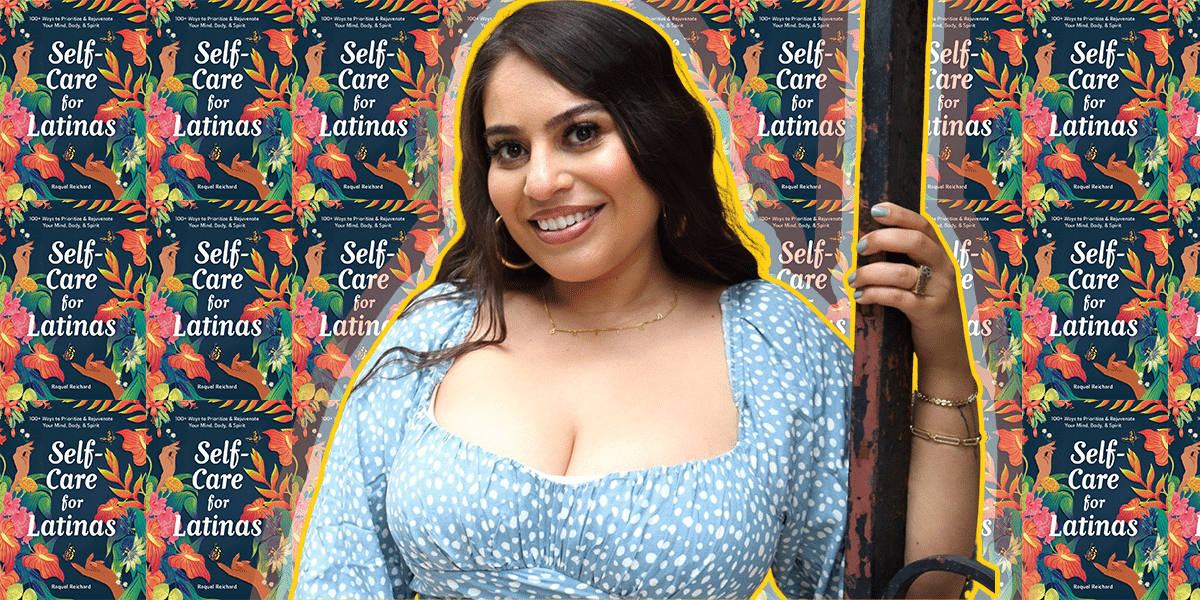Raquel Reichard is many things. She’s an award-winning journalist and editor who focuses on Latinidad, reproductive justice, and wellness. She’s the Deputy Director for Refinery29’s Latine vertical Somos. She’s a great friend and mentor with a kind heart. She’s a Cancer, and now she’s a published author. Raquel’s debut book Self-Care For Latinas: 100+ Ways to Prioritize & Rejuvenate Your Mind, Body, & Spirit offers a lot more than meets the eye. Not only is it a guide with various self-care tips, it also offers important systemic context to the traumas that commonly plague Latinas.
Sofía Viera and Raquel Reichard sit down on Google Meet to discuss Self-Care For Latinas, New Year resolutions, and grief.

Sofía Viera: What does self-care mean to you?
Raquel Reichard: For me, self-care is really listening to your body. Self-care is learning the language of your mind, body, and spirit, and then heading its cause. So that can be something different for everyone — because what my body or my mind or my spirit is needing from me might be different from what [yours] needs from you. It’s learning that new language and deciphering the codes. And that could be maybe a bath, that could be maybe a hike, that could be maybe time with Mami or with community. It could mean so many different things — but only you’ll know.
Sofía Viera: And how did the idea for Self-Care For Latinas come to you? When did you first realize that this was a book that you needed to write?
Raquel Reichard: So, this book is a popular title from Adams Media, which is an imprint of Simon and Schuster. They have different similar titles like Self-Care For Black Women and Self-Care For Black Men. They were looking for someone who would write Self-Care For Latinas. The book had already been greenlit, and they reached out to a few writers. They asked me to send over [an] overview of how I would approach the book. They reached out to me, I’m guessing, given my history of work all around this subject as a journalist. I’ve centered my career on Latina body politics, and a lot of that has included wellness, reproductive justice, gender violence, body image, and mental health…
So much of the work that I have done informs how I think about self-care. Not only do I share self-care tips, techniques, and exercises, but also each of these practices has context on why they might be necessary or helpful to a Latina reader, and that context dives into issues like colonialism, xenophobia, sexism, transphobia, family separation, and anti-blackness — all of these different things, because for me you have to. As women who are ethnically and racially marginalized, you can’t talk about self-care without first identifying the systems, cultures, and structures that make us physically, mentally, and spiritually unwell.
If we just advise [a] mani-pedi without addressing the underlying systemic and cultural issues, that’s nothing more than a band-aid.
Raquel Reichard
Sofía Viera: You mentioned a little bit about this, but how has your career as a journalist informed this book?
Raquel Reichard: A lot of what my reporting has focused on has been the structures and cultures that harm us — whether that’s the patriarchy or that’s the ways in which the values we learn at home clash with the values that we learn in the classroom or in the dominant society. These are things that I’ve covered throughout my career and these are also things that impact the daily lives of Latinas.
You have to bring a lot of that context that I feel is necessary. That’s a part that has long been missing when we had this conversation around self-care and center it on mani-pedi’s or wine with friends or whatever it may be, going to the nail salon, hair salon, all those things — no shade because they definitely can be part of your self-care routine — but if we just advise [a] mani-pedi without addressing the underlying systemic and cultural issues, that’s nothing more than a band-aid.
The first part is really understanding why you are unwell. This book provides a lot of that context and it helps readers make sense of [and name these] experiences.
Not only do I share self-care tips, techniques, and exercises, but also each of these practices has context on why they might be necessary or helpful to a Latina reader, and that context dives into issues like colonialism, xenophobia, sexism, transphobia, family separation, and anti-blackness.
Raquel Reichard
Sofía Viera: This year will be your first one as a published author. How does that feel?
Raquel Reichard: Wild, absolutely wild. I feel like I have said, “That’s wild. This is wild,” multiple times a day, every single day since February. That’s another wild thing — the publisher reached out to me in February. We signed the contract. I started writing it in March. The deadline was three months later, June 1st, and literally the book is out in the same year. It all happened in the same year. No other word but wild.
Sofía Viera: To close, I do have to ask… Do you have any resolutions for 2024?
Raquel Reichard: I would say it goes hand in hand with my resolution for this past year. As you know, as a lot of folks know, but maybe not everyone… I’ve had a really terrible few years and just grief swallowed me up whole. So, my resolution for this year was to come back to life. And I feel like I’ve done that — I’m going outside more. I’m doing more. I’m doing more things and my life looks more like it did before grief struck in such a deeply terrible way. For 2024, it’s more of that. I really just want to do more living.

